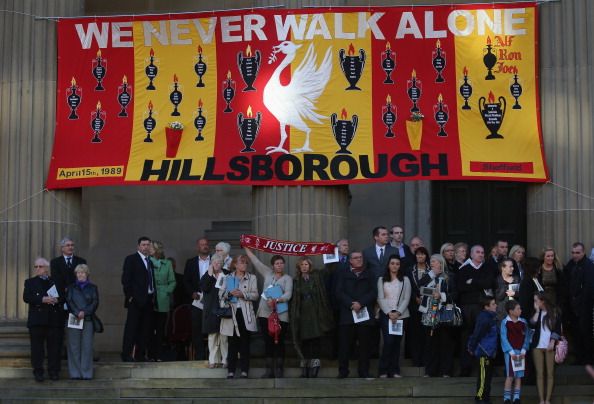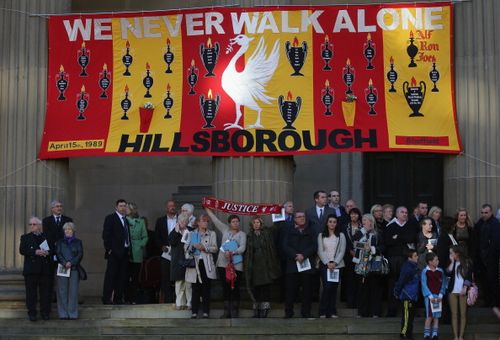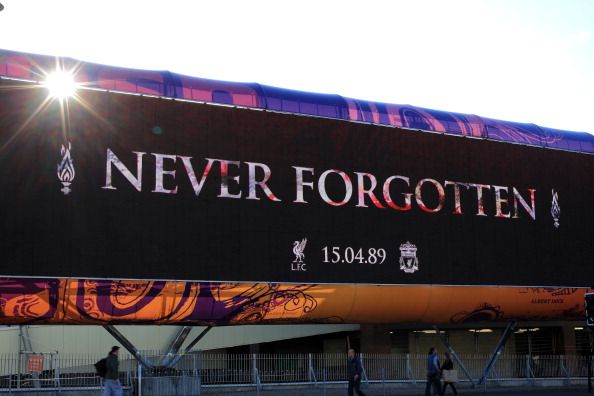
Remembering Hillsborough: The loss and the faith
Football. A beautiful game to its die-hard fans. A symbol of pure bliss to the children who play it. The lid to a pressure cooker for over-stressed corporate honchos. The key to the exit of a mundane life ruled by daily chores for some others. Something that creates some sort of positivity, in varying degrees, for everyone, everywhere.
Yet, for 96 families who live across the Merseyside in England, football has brought pain, tears, immense sadness and permanent losses. For the 96 who never returned from the Hillsborough Stadium, Sheffield on the 15th of April, 1989, and for their families, whose fighting spirit is as strong as that of the club they worship, football is justice. Nothing more, nothing less and certainly, nothing else.
Liverpool FC. One of the two main factions of the football-mad Merseyside region. A club with a history as rich as any other. Adored, worshipped and followed all around the world, Liverpool and everybody related to the club never have to walk alone.
Here, the team anthem is more than just the Korbos, Lorbos and Jeetbos. The club, like all other world giants, has never been short of passionate fans and players. But ever since April 15, 1989, compassion has ruled the hearts of the Reds as much as passion. The club and its people have never stopped fighting. They never will, until justice is restored.
The 96 are buried in the Hillsborough memorial, which today, is as much a part of Anfield as the Shankly Gates and The Kop. They are remembered in every single Liverpool match, home or away, by the fans. They are immortalised by the Liverpool shirt, by the eternal flames. And now, from the heavens above, they are tantalisingly close to seeing justice being restored.
Moving on from ambiguities to fact: the 1989 FA Cup semifinal between Nottingham Forest and Liverpool FC was scheduled for the 15th of April, 1989 at the Hillsborough Stadium, Sheffield, barely a few miles away from Merseyside. The choice of venue was a big controversy in itself, as the stadium witnessed minor accidents and stampedes a year earlier, for the same fixture, between the same teams.
Also, Hillsborough had a history of being unsafe, right from the early 1980s when it introduced turnstiles in order to avoid pitch invasions by fans. Though the club lodged a complaint regarding the venue, nothing happened. The match was to be played as scheduled. It was on matchday that something more baffling took place.
The Liverpool fans, the majority on the day, were allocated the much smaller Leppings Lane End, while the larger South and East Lane Ends were allocated to the Notts fans. Different cock-and-bull stories have been given by the Sheffield Police for this. As it was, a disaster was waiting to happen, with the LL End turning into a bottleneck. The indifferent policing made the fans even more vulnerable.
In order to accommodate 5000 fans with match tickets into the LL End, which was already more than full, the police opened the exit gates for their entry. The iron turnstiles in front and 5000 people blocking the exit led to the fans being trapped. The police realised all this only after the match was over, and things were out of control by then. In the commotion that ensued thereafter, 766 Liverpool fans were injured and 82 dead. 14 others died in the hospitals a few hours later. An entire city was brought to a standstill.
In the blame game that followed, nothing of substance took place, with the FA blaming the police and vice versa. Slowly, but surely, wounds were healed and characters revealed as King Kenny, Ian Rush, John Barnes and others paid tributes to the ones who suffered irreparable losses. The great Dalglish, a Scot by birth and a Scouser at heart, visited many of the families personally, showing empathy beyond belief.
The Hillsborough Family Trust, which has been fighting ever since, and other such organisations deserve praise of the highest order for their bravery, selflessness and love. Coming back to the aftermath, the British tabloid The Sun launched a dirty and massive tirade at the fans of the club, blaming them for what happened. Adding unforgivable insult to irretrievable injury, the newspaper went as far as insulting the fans of urinating on the policemen.
Also adding fuel to the fire was the apathy shown by the Iron Lady, the late Margaret Thatcher. Not only did she condone the policemen for the calamity, she went on to say in her now infamous report – “Liverpool fans, who have caused trouble before , may feel vindicated”. Hardly any consolation to the grieving and the bereaved. Thatcher has been seen only through the eyes of hate by the Scousers; unfortunately, albeit rightly.
And today, almost a quarter of a century on, we celebrate the faith of the players, of the families, of the British and world footballing community, and of humanity. While lives were lost, heroes were born.
None as big as this great club, conducting the Hillsborough service every year, standing by the families, providing support beyond strength and belief to everybody involved; the Hillsborough family trust, a group of wonderful human beings, as determined and unselfish as any we could ever see; players like Paul Harrison and Steven Gerrard who lost their kith and kin; the fans of Liverpool Football Club who sing their hearts out for the 96, week after week, match after match, turning Anfield into a cauldron of emotions; and all the fans of the rival clubs, right from the blue-nosed enemies, Everton, to that great team in Manchester.
They, the fans from England and the world over, have proven that faith, spirit and love are above the game itself. And that is what makes football, and sport itself, beautiful. To fans all over the world, of any and every sport, don’t lose faith, don’t lose heart. Scandals and tragedies happen. But we shouldn’t lose to them. We shouldn’t give up. Ultimately, we should ensure that faith wins; that humanity wins; that the game wins.
You’ll Never Walk Alone.

